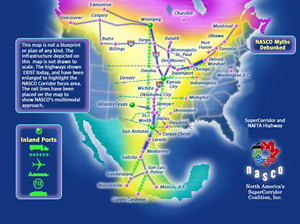 |
 |
 |
 Editorials | At Issue | July 2006 Editorials | At Issue | July 2006  
NAFTA Highway Faces Uncertain Future
 Mike Sunnucks - The Business Journal of Phoenix Mike Sunnucks - The Business Journal of Phoenix


| | (See larger graphic below) |
A proposed business-backed superhighway link between Arizona, Mexico and Canada is running into skepticism about whether it actually will be built and worries that it will result in more U.S. and Mexican job losses to China.

The planned Canamex corridor is a one of a series of so-called North American Free Trade Agreement superhighways ballyhooed as improving trade and transportation links between Mexico, Canada and the U.S. The corridor involves improving and linking highways from Mexico City and the Mexican state of Sonora through Nogales, Tucson, Phoenix, Las Vegas and Salt Lake City and north into Alberta, Canada.

Phoenix Congressman Ed Pastor, a key border state lawmaker, questions whether the superhighway will ever happen, and free-trade skeptics worry such a corridor will make it easier for Chinese goods to get into North America - which they say could result in more U.S. and Mexican job losses to Asia.

The planned roadway would traverse Arizona via Interstates 10 and 19 and Route 93 over the Hoover Dam. Backers of Canamex include business groups and free-trade advocates. They see the corridor as a way to increase trade and tourism. Mexico and Canada are the state's top trading and tourism partners.

"It is a good idea," said Maria Luisa O'Connell, president of the Phoenix-based Border Trade Alliance.

Pastor, however, questions whether the highway link will ever be built, pointing to the lack of progress and major funding on the coordinated highway project. Canamex has been in the works since 1995.

Some states and provinces have moved forward with planning related to the corridor and improvements of some highways that will be linked to the trade route. But, more than a decade later, there has yet to be major funding or a sweeping, coordinated effort related to the project.

Pastor voted for NAFTA but now regrets that vote. He opposes business-backed free trade accords, citing concerns about job losses and the lack of environmental and labor standards in Latin American and Asian markets. He also worries about potential job losses if increased links to Mexico encourage companies to ship jobs out of the U.S.

The Phoenix congressman is a high-ranking Democrat on the House Appropriations Committee, which gives him a hand in deciding which projects get funding, and which don't. That hand could be a lot a stronger next year if Democrats win congressional elections in November.

There also are NAFTA highways planned through Texas and other Western states. Business interests - including the U.S. Chamber of Commerce - support those roads, arguing they will facilitate North American trade.

The Border Trade Alliance's O'Connell said Canamex has made progress in recent years, despite an increased focus on border security and not trade. She said Canamex corridor efforts also include improvements to cross-border electronic communications and technology links among NAFTA partners.

Bill Hawkins, an economist with the anti-free trade U.S. Business & Industry Council, said construction of Canamex and other NAFTA superhighways will not help spur U.S./Mexican economic growth but instead will result in more Chinese exports to North America.

Both the U.S. and Mexico have lost manufacturing, textile and other jobs to China in recent years because the Asian power offers cheap labor and a burgeoning marketplace.

"The question today is what will be in the trucks: Mexican goods or Chinese goods?" said Hawkins, whose group opposes recent free trade accords inked by the U.S. "Mexico is being skipped over for more direct trade with Asia. Mexican industry, already being battered by Chinese competition, will be hurt further."

Hawkins said China already has labor cost advantages over Mexico and the U.S., and the only advantage North American firms have is geography. He said NAFTA highways and proposed port improvements on Mexico's west coast will increase Chinese access to North America and drive more jobs across the Pacific.

O'Connell and other Canamex and NAFTA backers counter that improving transport links between Mexico and border states such as Arizona will make trade easier and encourage job growth and business investment.

Tiffany Wiazlowski, spokeswoman for the American Trucking Association, said her industry group supports the idea of improving trade links.

"ATA is supportive of the concept of developing trade corridors," said Wiazlowski, who declined to talk about Canamex or other specific projects.

| 
 | |
 |



